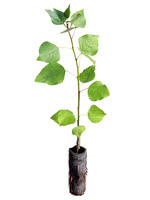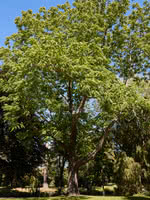Mon-Fri 9am - 5pm Mountain time
Black Walnut vs Quebec Poplar
Populus x P38P38
Juglans nigra
CUSTOM GROW
NOT AVAILABLE THIS SEASON - MIGHT RETURN
A hybrid of Simon's Poplar and Balsam Poplar, Quebec Poplar is a fast-growing deciduous tree. This particular selection was one of the finalists for the Quebec Ministry of Forest's Hybrid Poplar breeding program.
It is useful for quickly establishing a privacy screen or as part of a shelterbelt, and prefers moist soil. Disease resistance is likely high as is cold hardiness.
Quebec is a province with a strong forestry sector and we are excited to be offering this variety.
The Black Walnut is a slow growing, large, straight-stemmed tree with an open crown. It produces dense, very hard, edible nuts.
Black Walnut has a deeply-furrowed, black bark. Its leaves are about 1 foot long, composed of 15 - 23 slightly stalked leaflets on a moderately stout stock which provide good dappled shade.
Despite being highly valued for its edible nuts and its shade tree aesthetics, it is rare to see this tree on the prairies.
Note: Black Walnut's roots produce a substance named juglone that is toxic to some other plants. Consider this when choosing where you plant a black walnut, as you will not be able to grow tomato, potato, cabbage, eggplant, blueberry, azalea, rhododendron, lilac, red pine and apple in the surrounding area.
Note: Plant this tree once. It will not respond well to transplanting.
Note: Although self-pollinating, planting two trees significantly improves nut production.
A top CO2 absorbing species. Experts think this tree may help climate change more than others.

